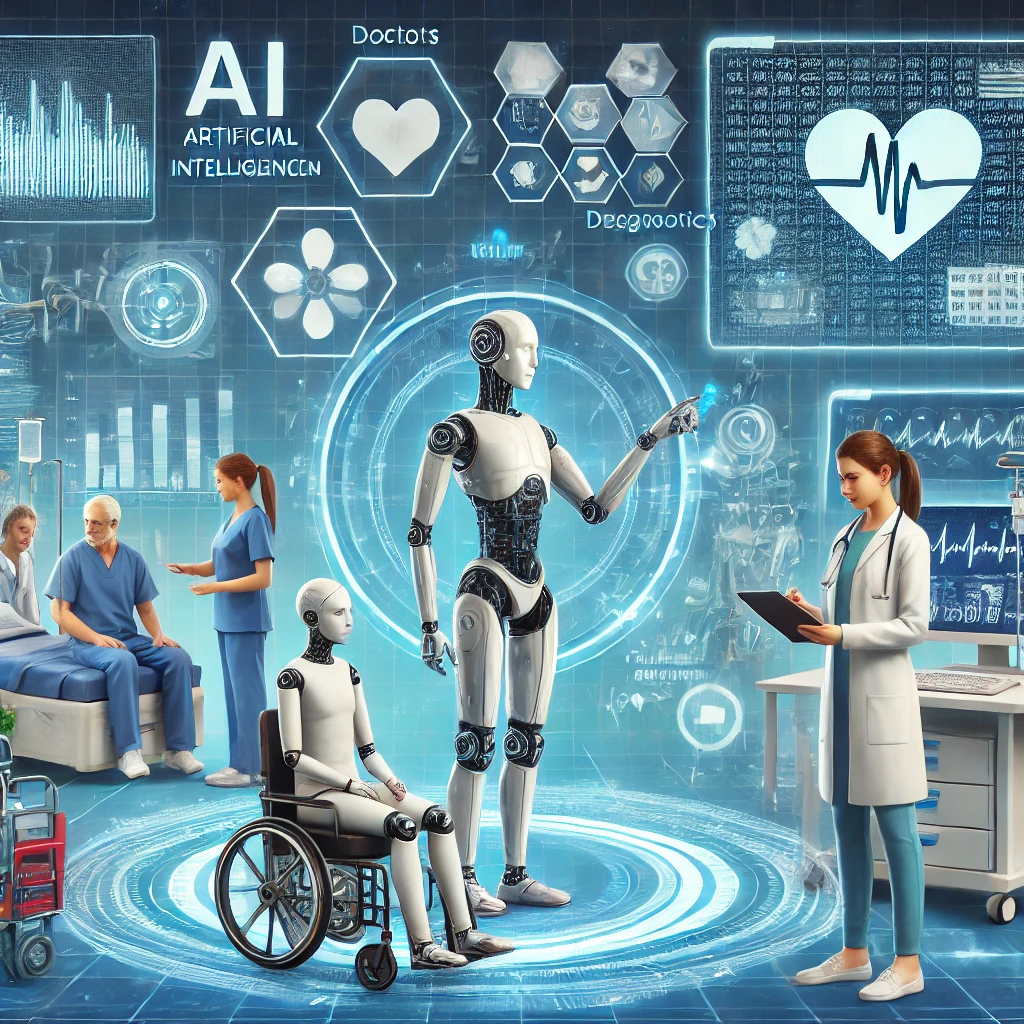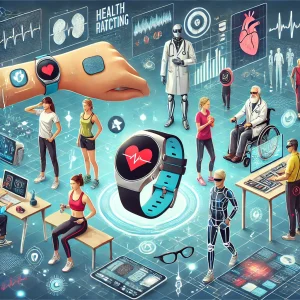Introduction
Artificial Intelligence (AI) is transforming industries worldwide, and healthcare is no exception. From diagnosing diseases faster to personalizing treatment plans and enhancing patient care, AI is revolutionizing how medicine is practiced. Its ability to analyze vast amounts of data and learn from patterns offers unparalleled opportunities to improve patient outcomes and save lives. This article explores how AI is reshaping the healthcare landscape and the benefits and challenges it presents.
How AI is Revolutionizing Diagnosis and Treatment
Faster and More Accurate Diagnoses
One of the most significant advantages of AI in healthcare is its ability to detect diseases earlier and more accurately. Machine learning algorithms analyze medical images—such as X-rays, MRIs, and CT scans—often outperforming human radiologists in identifying conditions like cancer, pneumonia, and fractures. For instance, AI tools like Google’s DeepMind have demonstrated exceptional accuracy in detecting eye diseases and breast cancer.
Personalized Treatment Plans
AI enables the development of tailored treatment strategies by analyzing a patient’s medical history, genetic information, and lifestyle data. By predicting how a patient might respond to specific medications or therapies, healthcare providers can create more effective and targeted treatment plans. Companies like IBM Watson Health use AI to assist oncologists in recommending personalized cancer treatments, improving survival rates and quality of life.
Enhancing Patient Care and Hospital Operations
Virtual Health Assistants
AI-powered virtual health assistants provide patients with round-the-clock support. These tools can answer medical questions, remind patients to take medications, and schedule appointments. Chatbots like Ada and Babylon Health offer initial symptom assessments, reducing unnecessary visits to emergency rooms and allowing doctors to focus on critical cases.
Streamlining Administrative Tasks
Hospitals and clinics often face administrative burdens that take time away from patient care. AI solutions automate tasks like medical record management, billing, and appointment scheduling. This automation reduces errors, improves efficiency, and frees up healthcare professionals to spend more time with patients.
AI in Drug Development and Research
Accelerating Drug Discovery
Developing new medications is traditionally a lengthy and expensive process, often taking over a decade. AI accelerates this timeline by predicting how different compounds interact with biological targets. By analyzing vast datasets, AI models can identify potential drug candidates faster and more cost-effectively. Pharmaceutical companies like Pfizer and Moderna have leveraged AI to expedite vaccine and drug development, especially evident during the COVID-19 pandemic.
Enhancing Clinical Trials
AI plays a pivotal role in optimizing clinical trials by identifying suitable participants and predicting potential side effects. This technology ensures trials are more efficient and representative, ultimately bringing safe and effective treatments to market faster.
Remote Monitoring and Telemedicine
Continuous Patient Monitoring
Wearable devices equipped with AI monitor vital signs such as heart rate, blood pressure, and oxygen levels in real-time. This data helps healthcare providers detect early warning signs of conditions like heart disease or diabetes complications. Remote monitoring reduces hospital readmissions and improves chronic disease management.
Expanding Access to Care
Telemedicine, powered by AI, has expanded healthcare access, especially in rural or underserved areas. Patients can consult doctors remotely, receive diagnoses, and even undergo therapy sessions through virtual platforms. AI algorithms assist in these consultations by analyzing patient data and providing real-time recommendations to healthcare providers.
Challenges and Ethical Considerations
Data Privacy and Security
With AI’s reliance on vast amounts of patient data, ensuring privacy and security is paramount. Healthcare providers must adhere to regulations like the Health Insurance Portability and Accountability Act (HIPAA) to protect sensitive information. Implementing robust cybersecurity measures is essential to prevent data breaches and maintain patient trust.
Bias and Fairness
AI systems are only as good as the data they are trained on. If datasets lack diversity, AI tools may produce biased outcomes, leading to disparities in care. It’s crucial to use comprehensive and representative data to develop equitable AI solutions in healthcare.
Balancing Technology and Human Interaction
While AI enhances efficiency, it’s vital to preserve the human touch in patient care. Empathy, compassion, and understanding cannot be replaced by machines. Healthcare providers must find a balance between leveraging technology and maintaining meaningful patient relationships.
The Future of AI in Healthcare
The future of AI in healthcare is promising, with ongoing advancements poised to further revolutionize medicine. Potential developments include:
- Predictive analytics for anticipating disease outbreaks and personal health risks.
- AI-powered robotic surgeries that enhance precision and reduce recovery times.
- Natural language processing (NLP) tools that streamline clinical documentation.
- Integration with genomics to provide more precise treatments tailored to individual genetic profiles.
As technology evolves, collaboration between tech companies, healthcare providers, and policymakers will be essential to ensure AI is used responsibly and ethically.
Conclusion
Artificial Intelligence is transforming healthcare by improving diagnostics, personalizing treatments, streamlining operations, and expanding access to care. Its ability to analyze data at unprecedented speeds is saving lives and revolutionizing how medicine is practiced. While challenges like data privacy and bias remain, thoughtful implementation and ongoing collaboration can harness AI’s full potential for the benefit of patients and healthcare professionals alike. As AI continues to evolve, it holds the promise of a future where healthcare is more efficient, accessible, and patient-centered.


